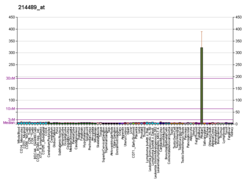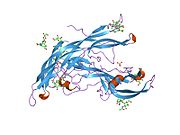FSHB
Follitropin subunit beta also known as follicle-stimulating hormone beta subunit (FSH-B) is a protein that in humans is encoded by the FSHB gene.[5][6][7] Alternative splicing results in two transcript variants encoding the same protein.
Function
[edit]The pituitary glycoprotein hormone family includes follicle-stimulating hormone, luteinizing hormone, chorionic gonadotropin, and thyroid-stimulating hormone. All of these glycoproteins consist of an identical alpha subunit and a hormone-specific beta subunit. This gene encodes the beta subunit of follicle-stimulating hormone. In conjunction with luteinizing hormone, follicle-stimulating hormone induces egg and sperm production.[7]
The FSHB gene in human DNA encodes the follicle-stimulating hormone subunit beta protein (FSH-B), or Follitropin Beta. More specifically, the FSHB gene encodes for the beta subunit of follicle-stimulating hormone (FSH). Therefore, proper transcription of FSHB allows for the proper production of FSH. FSH is a peptide hormone the pituitary gland produces that is involved with the reproductive system. FSH promotes follicular oocyte (egg) production, growth, and maturation and helps control a female's menstrual cycle. Additionally, FSH is involved in the male reproductive system by stimulating spermatogenesis (maturation of sperm cells) and initiating puberty. Studies show that variations in the FSHB gene can contribute to the likelihood of a woman becoming pregnant with fraternal, or dizygotic, twins.[8] This is because certain heritable variations of FSHB contribute to increased production of FSH from the pituitary gland, raising the levels of FSH found in a woman’s blood. It is also shown that women with these FSHB variants had their first menstrual cycle, children, and menopause at an earlier age than women without the variant.[8] This relates to having an increased risk of a woman bearing fraternal twins because higher levels of FSH will produce more eggs.[9] The more eggs a woman produces increases the chance of multiple eggs ovulating and becoming fertilized by sperm. In retrospect, depending on the type of variation, the FSHB gene could potentially cause infertility by the inability to produce enough FSH, in both males and females.[8] [10] [11] Additionally, low or no FSH can result in delayed puberty and risk of disease.[12] [13] Diseases associated with FSHB variants are hypogonadism, hypogonadotropic hypogonadism type 24 (HH24), and type 7 (HH7), and are possibly linked to polycystic ovary syndrome.[12] [13] [14]
References
[edit]- ^ a b c GRCh38: Ensembl release 89: ENSG00000131808 – Ensembl, May 2017
- ^ a b c GRCm38: Ensembl release 89: ENSMUSG00000027120 – Ensembl, May 2017
- ^ "Human PubMed Reference:". National Center for Biotechnology Information, U.S. National Library of Medicine.
- ^ "Mouse PubMed Reference:". National Center for Biotechnology Information, U.S. National Library of Medicine.
- ^ Watkins PC, Eddy R, Beck AK, Vellucci V, Leverone B, Tanzi RE, Gusella JF, Shows TB (Aug 1987). "DNA sequence and regional assignment of the human follicle-stimulating hormone beta-subunit gene to the short arm of human chromosome 11". DNA. 6 (3): 205–12. doi:10.1089/dna.1987.6.205. PMID 2885163.
- ^ Shome B, Parlow AF, Liu WK, Nahm HS, Wen T, Ward DN (Sep 1989). "A reevaluation of the amino acid sequence of human follitropin beta-subunit". J Protein Chem. 7 (4): 325–39. doi:10.1007/BF01024882. PMID 3151250. S2CID 20497546.
- ^ a b "Entrez Gene: FSHB follicle stimulating hormone, beta polypeptide".
- ^ a b c Mbarek H (May 5, 2016). "Identification of Common Genetic Variants Influencing Spontaneous Dizygotic Twinning and Female Fertility". Am J Hum Genet. 98 (5): 898–908. doi:10.1016/j.ajhg.2016.03.008. PMC 4863559. PMID 27132594.
- ^ Lambalk C (Oct 25, 1998). "The endocrinology of dizygotic twinning in the human". Mol Cell Endocrinol. 145 (1–2): 97–102. doi:10.1016/s0303-7207(98)00175-0. PMID 9922105. S2CID 38939075.
- ^ Matthews C (Sep 1993). "Primary amenorrhoea and infertility due to a mutation in the beta-subunit of follicle-stimulating hormone". Nat Genet. 5 (1): 83–6. doi:10.1038/ng0993-83. PMID 8220432. S2CID 24553363.
- ^ Bohaczuk S (Jan 2021). "FSHB Transcription is Regulated by a Novel 5′ Distal Enhancer With a Fertility-Associated Single Nucleotide Polymorphism". Endocrinology. 162 (1): bqaa181. doi:10.1210/endocr/bqaa181. PMC 7846141. PMID 33009549.
- ^ a b Layman L (Aug 1997). "Delayed puberty and hypogonadism caused by mutations in the follicle-stimulating hormone beta-subunit gene". N Engl J Med. 337 (9): 607–11. doi:10.1056/NEJM199708283370905. PMID 9271483.
- ^ a b Kottler M (2009). "FHSB gene mutation in a female with delayed puberty and hypogonadism: response to recombinant human FSH". Folia Histochemica et Cytobiologica. 47 (5): S55–S58. doi:10.2478/v10042-009-0054-7. PMID 20067895.
- ^ Hong S (June 2020). "Relationship between the characteristic traits of polycystic ovary syndrome and susceptibility genes". Sci Rep. 10 (1): 10479. Bibcode:2020NatSR..1010479H. doi:10.1038/s41598-020-66633-2. PMC 7320020. PMID 32591571.
Further reading
[edit]- Barrios-De-Tomasi J, Timossi C, Merchant H, Quintanar A, Avalos J, Andersen C, Ulloa-Aguirre A (2002). "Assessment of the in vitro and in vivo biological activities of the human follicle-stimulating isohormones". Mol. Cell. Endocrinol. 186 (2): 189–98. doi:10.1016/S0303-7207(01)00657-8. PMID 11900895. S2CID 27824657.
- Saxena BB, Rathnam P (1976). "Amino acid sequence of the beta subunit of follicle-stimulating hormone from human pituitary glands". J. Biol. Chem. 251 (4): 993–1005. doi:10.1016/S0021-9258(17)33791-2. PMID 1249074.
- Keene JL, Matzuk MM, Otani T, Fauser BC, Galway AB, Hsueh AJ, Boime I (1989). "Expression of biologically active human follitropin in Chinese hamster ovary cells". J. Biol. Chem. 264 (9): 4769–75. doi:10.1016/S0021-9258(18)83656-0. PMID 2494176.
- Jameson JL, Becker CB, Lindell CM, Habener JF (1988). "Human follicle-stimulating hormone beta-subunit gene encodes multiple messenger ribonucleic acids". Mol. Endocrinol. 2 (9): 806–15. doi:10.1210/mend-2-9-806. PMID 3139991.
- Shome B, Parlow AF (1974). "Human follicle stimulating hormone: first proposal for the amino acid sequence of the hormone-specific, beta subunit (hFSHb)". J. Clin. Endocrinol. Metab. 39 (1): 203–5. doi:10.1210/jcem-39-1-203. PMID 4835136.
- Fujiki Y, Rathnam P, Saxena BB (1980). "Studies on the disulfide bonds in human pituitary follicle-stimulating hormone". Biochim. Biophys. Acta. 624 (2): 428–35. doi:10.1016/0005-2795(80)90084-7. PMID 6774759.
- Böckers TM, Nieschlag E, Kreutz MR, Bergmann M (1995). "Localization of follicle-stimulating hormone (FSH) immunoreactivity and hormone receptor mRNA in testicular tissue of infertile men". Cell Tissue Res. 278 (3): 595–600. doi:10.1007/BF00331379. PMID 7850869. S2CID 21371634.
- Matthews CH, Borgato S, Beck-Peccoz P, Adams M, Tone Y, Gambino G, Casagrande S, Tedeschini G, Benedetti A (1993). "Primary amenorrhoea and infertility due to a mutation in the beta-subunit of follicle-stimulating hormone". Nat. Genet. 5 (1): 83–6. doi:10.1038/ng0993-83. PMID 8220432. S2CID 24553363.
- Layman LC, Lee EJ, Peak DB, Namnoum AB, Vu KV, Van Lingen BL, Gray MR, McDonough PG, Reindollar RH (1997). "Delayed puberty and hypogonadism caused by mutations in the follicle-stimulating hormone beta-subunit gene". N. Engl. J. Med. 337 (9): 607–11. doi:10.1056/NEJM199708283370905. PMID 9271483.
- Cargill M, Altshuler D, Ireland J, Ireland J, Sklar P, Ardlie K, Patil N, Lane CR, Lim EP (1999). "Characterization of single-nucleotide polymorphisms in coding regions of human genes". Nat. Genet. 22 (3): 231–8. doi:10.1038/10290. PMID 10391209. S2CID 195213008.
- Grasso P, Rozhavskaya-Arena M, Reichert LE (1999). "Cysteine residues in a synthetic peptide corresponding to human follicle-stimulating hormone beta-subunit receptor-binding domain 81-95 [hFSH-beta-(81-95)] modulate the in vivo effects of hFSH-beta-(81-95) on the mouse estrous cycle". Regul. Pept. 81 (1–3): 67–71. doi:10.1016/S0167-0115(99)00022-1. PMID 10395410. S2CID 54387877.
- Ben-Menahem D, Hyde R, Pixley M, Berger P, Boime I (1999). "Synthesis of multi-subunit domain gonadotropin complexes: a model for alpha/beta heterodimer formation". Biochemistry. 38 (46): 15070–7. doi:10.1021/bi991510c. PMID 10563789.
- Dias Neto E, Correa RG, Verjovski-Almeida S, Briones MR, Nagai MA, Da Silva Jr W, Zago MA, Bordin S, Costa FF (2000). "Shotgun sequencing of the human transcriptome with ORF expressed sequence tags". Proc. Natl. Acad. Sci. U.S.A. 97 (7): 3491–6. Bibcode:2000PNAS...97.3491D. doi:10.1073/pnas.97.7.3491. PMC 16267. PMID 10737800.
- Hartley JL, Temple GF, Brasch MA (2001). "DNA Cloning Using In Vitro Site-Specific Recombination". Genome Res. 10 (11): 1788–95. doi:10.1101/gr.143000. PMC 310948. PMID 11076863.
- Fox KM, Dias JA, Van Roey P (2001). "Three-dimensional structure of human follicle-stimulating hormone". Mol. Endocrinol. 15 (3): 378–89. doi:10.1210/mend.15.3.0603. PMID 11222739.
- Amoresano A, Orrù S, Siciliano RA, Luca ED, Napoleoni R, Sirna A, Pucci P (2002). "Assignment of the complete disulphide bridge pattern in the human recombinant follitropin beta-chain". Biol. Chem. 382 (6): 961–8. doi:10.1515/BC.2001.120. PMID 11501762. S2CID 21539405.
- Walton WJ, Nguyen VT, Butnev VY, Singh V, Moore WT, Bousfield GR (2001). "Characterization of human FSH isoforms reveals a nonglycosylated beta-subunit in addition to the conventional glycosylated beta-subunit". J. Clin. Endocrinol. Metab. 86 (8): 3675–85. doi:10.1210/jcem.86.8.7712. PMID 11502795. S2CID 85884629.








